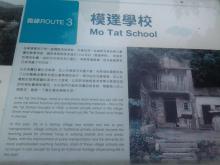Hong Kong Ratcatchers
Primary tabs
Can anyone please help me find the three Chinese characters for the occupation of Lou Shree Mong. I am preparing text for a publication of oral history interviews recorded with Australian born Chinese. One interviewee talks about getting out of Hong Kong after the Japanese occupation. One of his friends who was advising him on the best way to do this:
"worked for the Lou Shree Mong, the Sanitation department rat trappers. They were the street scavengers and wore a yellow uniform. I found out later that besides catching rats, the scavengers picked up the corpses as well as people beaten up by thugs and left for dead. The lives of such people depended on the scavengers. That was why they were so widely respected."
I am hopeful that among all the Gwulo members there is someone who can assist with the Chinese characters for these three words. It would be greatly appreciated. I can be contacted via Gwulo or directly on my email richard.horsburgh@bigpond.com.
Richard Horsburgh


Hong Kong Rat Catchers
Greetings! Here is another wild guess from yours truly.
According to one web site I consulted, the second word "shree" has one syllable, but I cannot think of a Chinese word that would produce such sound.
The accuracy of their pronounciation may have eroded over time, or different dialect, or a made-up spelling by the person who recorded the interview.
One possibility is Low Shi Moon (Cantonese dialect) which corresponds to 老 鼠 們, literally the first two words used together meaning rats, and the third word is plural as in group. So it translates to Rats Group or Rats Department.
Edit: In Cantonese dialect, service is translated to 服務 pronounced fok moll, the second word might have been spoken during the interview, so the result would be 老 鼠 務. I am stretching my imagination may be too far.
Regards, Peter
"lou shree mong"
I think the likely chinese name for "lou shree mong" should be 老鼠王 literally " rat king". the term is commonly used up till perhaps the 60s.
tw
老鼠王
I think Dr TW Wong is right - the name "老鼠王" makes the most sense and would be pronounced "Lou Suu Wong" in Cantonese as it is spoken today. Here is a reference that says that this term is commonly used for these officers from the HK Sanitary Department operating at the time.
"說到衛生方面,香港於1950年代,仍維持20世紀初起實行(
This refers to the deep clean of the affected area at the time in the 1950s, when these officers, informally known as "Lou Suu Wong" (Rat King) from the Sanitary Department would clean/disnfect entire buildings, annually. The public viewed this as a painful procedure.
Source - p.158 in this book about HK in the 1950s, titled "默默向上游 - 香港50年代社會形象" by author 鄭寶鴻:
https://books.google.co.uk/books?id=2FXeBAAAQBAJ&pg=PA158&lpg=PA158&dq=%...
There is even a picture of the streetcleaner on p.159, with his cart/trolley and broom dustpan. Not sure if this is the same as a "Lou Suu Wong" officer - will need to ask HK oldtimers who lived at the time to verify.
Page 193 and 198 of this book titled "吞聲忍語─日治時期香港人的集體回憶" by authors 劉智鵬, 周家建 also refers to "老鼠王" (Rat King) during the Japanese occupation period, narrating how some of these Rat King officers stole money from the deceased before turning their bodies in to hospitals and receiving double portions of rice rations, and even colluded with gangs in robbing citizens. In this book, the authors (on p.193) do say that the Rat King officers are the street cleaners (清道夫), so similar to the man pictured on p.159 in the book above.
https://books.google.co.uk/books?id=u5iTAgAAQBAJ&pg=PA193&lpg=PA193&dq=%...
Rat Catchers 老鼠王
Thank you vanessaf and drtwwong for the correction. I did not think that wong would match because it sounds different. Regards, Peter
Hong Kong Ratcatchers
Thank you everyone for your very helpful replies and we will follow those up. If anyone else has any further suggestions please let us know. Regards Richard
Could be a different dialect
Is it possible to find out the hometown of the Australian-born Chinese? The place/city where his parents were originally from may not be Guangzhou. By finding out the dialect of that place, the mysterious character "mong" can be more easily identified.
By the way, most of us should be familiar with the district of Mongkok (旺角) in Kowloon peninsular. In standard Cantonese, the character "mong" (旺) should be pronounced "wong" or "woong", but has somehow become "mong". The pronunciation of the character "王" is close to "旺". Only the intonation is different. So "老鼠王" should be the right words.
Thank You Everyone
Thanks to everyong who replied. As a few of you have identified, the correct name is "老鼠王" . We have also confirmed this by going back and listening to the original tape recording with the man who talked about the Hong Kong rat catchers and after reading the second book reference provided by Vanessaf above. Your assistance appreciated - Richard Horsburgh
Rat catcher or Department of Rat Catching
"worked for the Lou Shree Mong, the Sanitation department rat trappers"
If the term referred to the people doing the work, it would be 老鼠王.
If it referred to the government department doing the work, it would likely be called 老鼠部門 informally & abbreviated to as 老鼠門.
If it was Lou Shree Bong instead of Mong, then it could be 老鼠幫 and referred to the supervisors of the rat catchers, as Sanitation Dept. inspectors were generally known as 衛生幫(辦).
cantonese is one tough language ...
... when my son told me he wanted to learn cantonese (we live in the US), i told him to learn mandarin instead!
sighing and smh